牛津译林版七年级下册第一次月考讲课稿
最新译林牛津版七年级英语下册第一次月考试题及答案
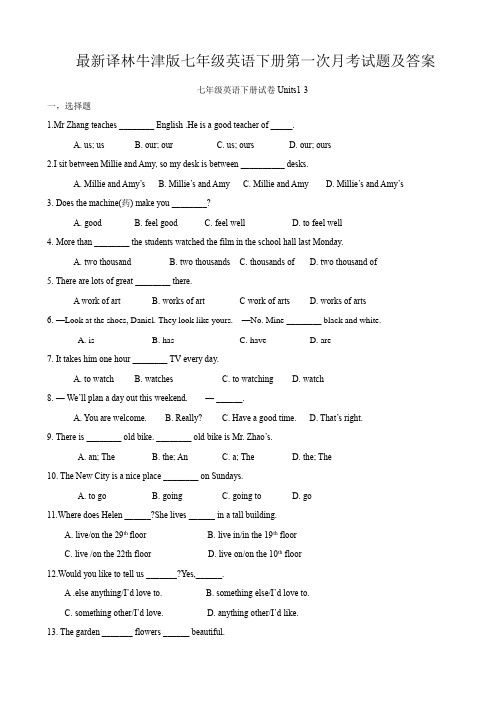
最新译林牛津版七年级英语下册第一次月考试题及答案七年级英语下册试卷Units1-3一,选择题1.Mr Zhang teaches ________ English .He is a good teacher of _____.A. us; usB. our; ourC. us; oursD. our; ours2.I sit between Millie and Amy, so my desk is between __________ desks.A. Millie and Amy’sB. Millie’s and AmyC. Millie and AmyD. Millie’s and Amy’s3. Does the machine(药) make you ________?A. goodB. feel goodC. feel wellD. to feel well4. More than ________ the students watched the film in the school hall last Monday.A. two thousandB. two thousandsC. thousands ofD. two thousand of5. There are lots of great ________ there.A work of art B. works of art C work of arts D. works of arts6. —Look at the shoes, Daniel. They look like yours. —No. Mine ________ black and white.A. isB. hasC. haveD. are7. It takes him one hour ________ TV every day.A. to watchB. watchesC. to watchingD. watch8. ––We’ll plan a day out this weekend. –– ______.A. You are welcome.B. Really?C. Have a good time.D. That’s right.9. There is ________ old bike. ________ old bike is Mr. Zhao’s.A. an; TheB. the; AnC. a; TheD. the; The10. The New City is a nice place ________ on Sundays.A. to goB. goingC. going toD. go11.Where does Helen ______?She lives ______ in a tall building.A. live/on the 29th floorB. live in/in the 19th floorC. live /on the 22th floorD. live on/on the 10th floor12.Would you like to tell us _______?Yes,______.A .else anything/I’d love to. B. something else/I’d love to.C. something other/I’d love.D. anything other/I’d like.13. The garden _______ flowers ______ beautiful.A. full of/isB. is full of/looksC. full with/areD. full of/look14.It’s _____ to come to China.A. his the first timeB.my first timeC. theirs first timesD. the our first time15 ----Where are you going? ----________ on a trip to South Hill.A I will goingB I shall goingC I’m goingD I’m going to16. He is _______ in hospital, so he is a ________ person.A. ill, illB. ill, sickC. sick, illD. /, ill17. - It's very hot in the room!-_______ the door open?A. Why don't keepB. Why don't to keepC. Why not keepD. Why not you to keep18. John often asks his teacher _______ help.A. toB. withC. forD. on19.—Excuse me . May I speak to Jill, please? —___________A. Yes, I amB. Do you know him?C. I am speakingD. This is Jill speaking20. ---Listen, the music sounds_______ .I like it very much. ---It’s Yesterday Once More, my favorite.A. wellB. badC. badlyD. good二、完型填空(10分)Things are always changing ___46___the clock, the weather, and even me. Nothing can always stay ___47___. My life is full of changes. Sometimes I don’t feel good about ___48___, but later things become better.My pet cat, Taffy, runs away. We look for her all over the house but we cannot ___49___ her. I miss her a lot and I am sad. Dad tells me that we can get another one. That makes me ___50___ again, but I will always remember Taffy.My best friend, Robin, just moves away. The moving van(搬运车) takes away everything and the house is___51___. Maybe I can not see her any more. Robin now lives at the foot of the hills far away from here. Mums says we can take ___52___ there and play with Robin again.When I start the new school year, I am afraid of all my new classmates in my class. I am afraid they __53__ like me. Now I am happy because I have lots of new friends. I love my class and my teacher.Yesterday I looked in the mirror(照镜子). My ___54___ looked like a Halloween pumpkin ___55___ I lost (失去) my first tooth. So I had a big surprise when I woke up(醒来) thi s morning. Isn’t that wonderful?46. A. likes B. like C. as D. are like47. A. nothing B. the same C. different D. time48. A. me B. him C. her D. them49. A. look at B. listen C. find D. follow50. A. sad B. happily C. happy D. sadly51. A. old B. broken C. bright D.empty(空的)52. A. a bike B. a boat C. a walk D. a train53. A. not B. aren’t C. can’t D. won’t54. A. face B. eyes C. ears D. mouth55. A. because B. so C. but D. or三.阅读理解(A)56.New York Museum is closed on ________.A. MondayB. FridayC. SaturdayD. Sunday57.Tommy is an 8-year-old boy. He wants to visit the City Flower Show with his parents. How much will they pay?A. $15.B. $20.C. $25.D. $30.58. If you want to get more information about English Summer Camp, you can _______.A. go to CanadaB. write to CEE/CCIEEC. call on (010) 66062607D. send an email to University of Toronto59.Who will give performances in Pop Music Week in Chaoyang Park?A. Bands.B. Dancers.C. Singers.D. Both A and C.60. Phillip, twenty years old, cannot go to ________.A. The City Flower ShowB. English Summer CampC. New York MuseumD. Pop Music Week(B)Welcome to Chinatowns(唐人街)What is a Chinatown? Is it a town in China? Of course not! It is in a foreign(外国的) country. It is a place where many overseas(海外的) Chinese live together.There are lots of Chinatowns in America. The biggest one is in New York. There are about 150,000 people in it. It is the home of Chinese New Yorkers. And it is also a good place to go.Shopping in ChinatownShopping in Chinatown is fun. You can find lots of things there. Most of them are made in China. Mott Street is the best place to shop because the things there are very cheap.Eating in ChinatownChinatown has more than 200 restaurants. You can enjoy traditional (传统的) Chinese food there.New Silver Palace Restaurant is one of the best restaurants. Why don't you have breakfast with a cup of green tea in it? You can eat some Shanghai food in Evergreen Restaurant.Living in ChinatownLiving in Chinatown is comfortable.You can find hospitals, schools, banks, libraries and supermarkets in it. In some schools, students must study Chinese. Many overseas Chinese send their children to these schools. They want their children to learn more about China and its culture(文化).61.Which of the following is TRUE?A. Chinatown is a town in China.B. There is only one Chinatown in the USA.C. All the Chinese people in foreign countries must live in Chinatown.D. The biggest Chinatown in the USA is the one in New York.62.The Chinatown in New York has __________ .A. 200,000 peopleB. hospitals but no librariesC. schools but no hospitalsD. some shops, restaurants and schools63.Which sentence is NOT right?A. It is fun to shop in Chinatown.B. Many things in Chinatown are made in the USA.C. The things in Mott Street are cheap.D. The Chinese can have green tea in Chinatown.64.Why do many overseas Chinese send their children to the schools where they must studyChinese?A. Because their children don't like English.B. Because it is cheap to study in these schools.C. Because there is no English schools for Chinese students there.D. Because they want their children to learn more about China and its culture.65.What is the meaning of the underlined word―Chinese New Yorkers‖?A. the people who are traveling in New York.B. the people who live in New York.C. the people from China who live in New York now.D. the people who love New York very much.C66.What do people want to do at Nancy’s Gym?A. To enjoy swimmingB. To learn skatingC. To become thinnerD. To become taller 67 Lucy likes skating. Which advertisement is she interested in?A. Ice WorldB. Water WorldC. Nancy’s GymD. Keep fit68. You can call at _________ when you want to swim.A. 45562233B. 88682526C. 21518296D. 8588252669. You can go to swim in Water World at___________.A. 8:00 a.m.B. 9:30 a.m.C. 10:00 p.m.D. 11:00 p.m.70. Which activity costs the most for an adult?A Keeping fit at Nancy’s Gym. B. Skating in Ice World.C. Swimming in Water World.D. Making the Telephone.四、词汇运用1.I think _____________ in the morning is good for old people. (jog)2. The ________(visit) names are on this piece of paper. Nancy ’s Gym Keep fit ! Lose weight! Ice World Have fun skating here ! Water World Open: 9 a.m to 9 p.m. Adults: $10 Children(aged 15 or under):$7 Come to Water World! Two pools for children Two large pools for adults Two restaurants Tel: 215182963. He wants to be an (art) when he grows up.4. He is looking forward to ___________ (hear)from his friends.5. You can’t finish the work (with) any help.6. ________(百万) of people come to the Great Wall every year.7. There are many___________ (工程师) in that factory.8. There’s some important ____________ (信息) in the newspaper.9. Are these shirts the __________ (wait) over there?10.--Who always __________(worry) about your study, Jack? --- My mother does.11. The old man is sick. Let’s take him to the ________ (当地的) hospital now.12. Our ___________(neighbour) houses look very beautiful.13. Many college students think it’s exciti ng to work in IT ____________(公司).14. How many ___________ (零) are there in this number?15. There are about ten students (study) in the classroom now.16. Nowadays, we can seldom see _____ (邮递员)riding bikes in the street.17. December is the _____________(twelve) month in a year.18. —Who is the boy with you? —He is a good friend of ____________ (I).19. The volunteers are going to work in two _________ (社区) this Sunday.20.You can ask him for help, because he is _______ (help)五、任务型阅读(共10分,每空1分)You are welcome to visit Xi’an. I’m Jane, your guide today. I am glad to tell you something about the city.Xi’an is a famous city in China. It is in the north-west of our country. It is more than 3000 years old and thirteen dynasties once make it their capital.It is very easy for you to visit Xi’an at any time. You can come here by bus, by train or by plane. There are many cultural relics on and under the ground and there are hundreds of old tombs here. There are also many famous snacks in Xi’an. They are very sweet and crispy, and many people enjoy eating them. Xi’an is far from the sea. It doesn’t rain very often, but you can see lots of trees and flowers here. People here work very hard. They are trying to make Xi’an a rich and beautiful city.The city of Xi’an六短文填空In China, we often say that a good neighbour is better than a brother in the next village. It’s very important for us to have a good n________.First, a good neighbour is a good f______. When your family move to a new house, your neighbour can help you carry some furniture(家具) l______ tables and sofas and tell you something about your neighbourhood. They will also i_______ all the members of your family to their homes to have dinner or have a hot d_______. It is c_______ to stay there.S_______, a good neighbour is also a good relative(亲戚) .When you travel, your neighbours w_____ take care of your house. And you can help them when they have the s______ situations(情况).Finally,we can get a very important lesson f_______ neighbours that having a good neigboiur is being a good neighbour yourself.答案完型BBDCC DDDAA阅读DCCDB DDBDC CACBBB.任务型阅读56.famous 57.north-west 58.sea 59.over 60.thirteen\1361.hundreds 62.snacks 63.train 64.many 65.rich六.首字母填空(10分)1. neighbour2. friend3. like4. invite5. drink6. comfortable7. Second8. will9. same 10. from。
最新译林版牛津英语七年级下册第二学期第一次月考试卷及答题纸复习课程
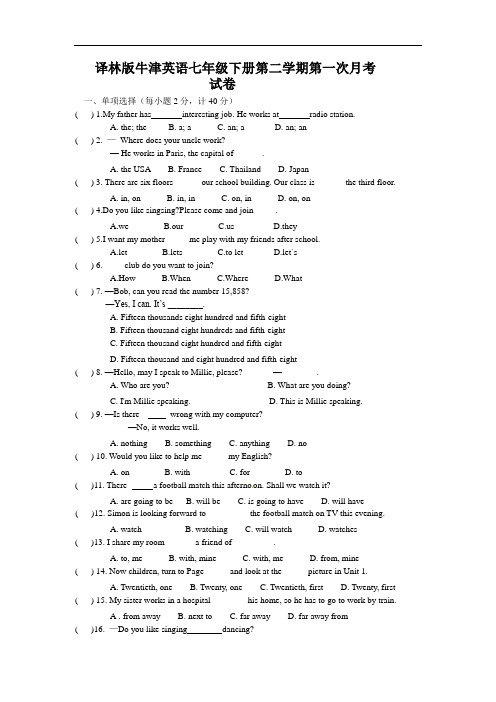
译林版牛津英语七年级下册第二学期第一次月考试卷一、单项选择(每小题2分,计40分)( ) 1.My father has interesting job. He works at radio station.A. the; theB. a; aC. an; aD. an; an( ) 2. —Where does your uncle work?— He works in Paris, the capital of ______.A. the USAB. FranceC. ThailandD. Japan( ) 3. There are six floors ______our school building. Our class is ______ the third floor.A. in, onB. in, inC. on, inD. on, on( ) 4.Do you like singsing?Please come and join_____.A.weB.ourD.they( ) 5.I want my mother _____me play with my friends after school.A.letB.letsC.to letD.let`s( ) 6._____club do you want to join?A.HowB.WhenC.WhereD.What( ) 7. —Bob, can you read the number 15,858?—Yes, I can. It’s ________.A. Fifteen thousands eight hundred and fifth-eightB. Fifteen thousand eight hundreds and fifth-eightC. Fifteen thousand eight hundred and fifth-eightD. Fifteen thousand and eight hundred and fifth-eight( ) 8. —Hello, may I speak to Millie, please? —________.A. Who are you?B. What are you doing?C. I'm Millie speaking.D. This is Millie speaking.( ) 9. —Is there wrong with my computer?—No, it works well.A. nothingB. somethingC. anythingD. no( ) 10. Would you like to help me _____ my English?A. onB. withC. forD. to( )11. There a football match this afterno on. Shall we watch it?A. are going to beB. will beC. is going to haveD. will have( )12. Simon is looking forward to _________ the football match on TV this evening.A. watchB. watchingC. will watchD. watches( )13. I share my room ______ a friend of _________.A. to, meB. with, mineC. with, meD. from, mine( ) 14. Now children, turn to Page _____ and look at the _____ picture in Unit 1.A. Twentieth, oneB. Twenty, oneC. Twentieth, firstD. Twenty, first ( ) 15. My sister works in a hospital________ his home, so he has to go to work by train.A . from away B. next to C. far away D. far away from( )16. —Do you like singing dancing?—I like dancing.A. andB. butC. soD. or( )17. Li Hua can English very well.A. saysB. tellC. speakD. talks( )18. My mother goes to after breakfast at seven forty.A. school; eatingB. school; eatC. work; eatingD. wo rk; eat( )19. —Let's watch TV.—.A.OK.I will notB. No,thanksC.That sounds good D.OK, I'd love to( )20. It takes about 30 minutes a bicycle from my home to school.A. rideB. ridingC. to rideD. rides二、完型填空(每小题1分,计10分)My name is Eric. I ____21_____ in a big city with my parents. My home is on the second ____22___ of a tall building. Th e building is in Garden Street. It’s a ___23_____street because there are lots of cars and people on the street every day. ____24____ the street is very clean. I ___25____ living in the city very much.There are a lot of ____26___ to have fun on the street. We can ___27___ games in the park and take a ____28____in the garden. Sometimes I can read books in the ___29____. It’s very quiet in the library, and I enjoy reading there. Do you like our ____30_____? Welcome to my home.( )21. A take B live C have D put( )22. A street B park C floor D house( )23. A busy B new C wrong D short( )24. A So B Because C But D And( )25. A like B watch C play D visit( )26. A gardens B supermarkets C places D rooms( )27. A playing B to play C plays D play( )28. A walk B bus C train D way( )29. A bank B restaurant C library D hospital ( )30. A food B study C neighbourhood D street三、阅读理解(每小题2分,计30分)(A)Tom is seven years old. He d on’t like school. He talks a lot in class, and the teacher is angry(生气) with him. He is often kept(留下) in after school.He doesn’t like to do homework, but he likes sports. He swims very well. He is the best swimmer in his class. He likes swimming so much that sometimes he forgets(忘记) to go to school.Tom’s father has an alarm(闹钟)。
牛津译林版英语七下第一次月考听力材料和参考答案

初中英语学习材料madeofjingetieji听力材料及参考答案第一部分听对话,回答问题本部分共有10道小题,每小题你将听一段对话,每段对话读两遍。
在听每段对话前,你有5秒钟的时间阅读题目;听完每段对话后你将有5秒钟的时间选出你认为最合适的备选答案1. W: Do you know Li Ming?M: Yes. He is my neighbour. He is a policeman. His parents are teachers. His sister is a doctor. .2. M: Philip, where are you going on holiday this summer?W: I’m going to stay with my uncle and aunt in New York. Next summer I’ll visit London.3. W: How many students in your class come to school on foot every day, Betty?.M: Only one third. Half of us ride bike instead.4. W: Have you ever been to the Bird Nest?M: Yes, we went there two years ago. It looks wonderful.5. M: What are you going to be when you grow up, Rose?W: I went to be a teacher., but my parents want me to be a doctor.6. M: Can we go fishing tomorrow?W: I’m afraid not. The weather report says it will be rainy tomorrow.7. M: Sarah, is that girl your sister?W: No, she’s my friend. Would you like to meet her?8. M: Can you give this pen to Luke for me?W: Sure. I’m going to have lunch with Janice. Then I’m meeting him this afternoon..9. W: There is a dictionary on the desk. Is it yours, Billy?M: No, it’s Ricky’s. I have lent mine to Tony.10. W: Wow! Max, you got an A in the physics exam.M: I love science. It’s interesting. But I still need to work harder at Chinese and English.你将听到一段对话和两篇短文,听两遍,在听每段对话或短文前,你将有5秒钟时间阅读相关题目,听完后你将有时间选择最合适的备选答案。
牛津译林版英语七年级下册Unit1Integratedskills公开课课件

( )13. We all think that the ________ century(世纪) will bring us more hopes.
A. twenty-first
B. twentieth-first C. twenty-one D. twentieth-one
( )14. She shares her room_______ a friend of_______.
C. your visit
D. you to visit
( )10. ---Thank you for ________ us the useful advice(建议). ---You are welcome.
A. give
B. giving
C. gave
D. to give
( )11. If you read a lot, your life will be full ___________ pleasure.
Presentation
2
dining room
garden
4
living room 1
kitchen
3
bedroom
6
bathroom
5
forks knives
TV sofa picture lamp
flowers fridge
shower toilet
Simon takes some notes. Are they true or faulse?
4.有朝一日,我会成为一名老师。 (some day) Some day I'll be a teacher.
Homework
1. Recite the dialogue on p14. 2. Finish the exercises after class.
2023-2024下册七年级英语第一次月考卷【测试七下Unit 1-Unit 2】(牛津译林版)
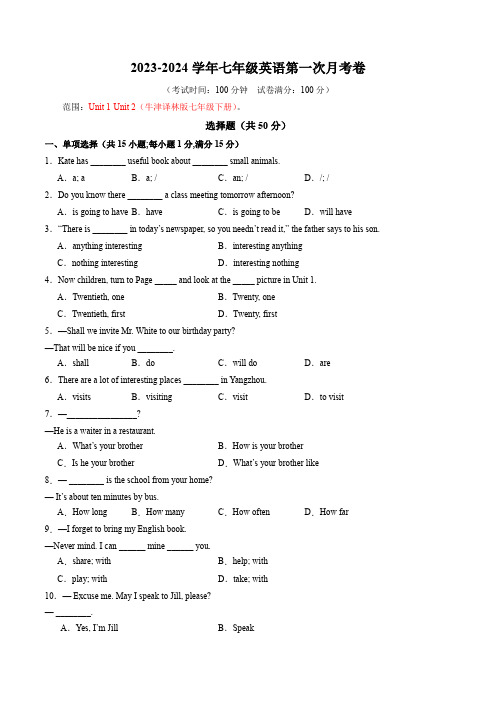
2023-2024学年七年级英语第一次月考卷(考试时间:100分钟试卷满分:100分)范围:Unit 1-Unit 2(牛津译林版七年级下册)。
选择题(共50分)一、单项选择(共15小题;每小题1分,满分15分)1.Kate has ________ useful book about ________ small animals.A.a; a B.a; /C.an; /D./; /2.Do you know there ________ a class meeting tomorrow afternoon?A.is going to have B.have C.is going to be D.will have 3.“There is ________ in today’s newspaper, so you needn’t read it,” the father says to his son.A.anything interesting B.interesting anythingC.nothing interesting D.interesting nothing4.Now children, turn to Page _____ and look at the _____ picture in Unit 1.A.Twentieth, one B.Twenty, oneC.Twentieth, first D.Twenty, first5.—Shall we invite Mr. White to our birthday party?—That will be nice if you ________.A.shall B.do C.will do D.are6.There are a lot of interesting places ________ in Yangzhou.A.visits B.visiting C.visit D.to visit 7.—________________?—He is a waiter in a restaurant.A.What’s your brother B.How is your brotherC.Is he your brother D.What’s your brother like8.— ________ is the school from your home?— It’s about ten minutes by bus.A.How long B.How many C.How often D.How far9.—I forget to bring my English book.—Never mind. I can ______ mine ______ you.A.share; with B.help; withC.play; with D.take; with10.— Excuse me. May I speak to Jill, please?— ________.A.Yes, I’m Jill B.SpeakC.I’m speaking D.This is Jill speaking11.—How long is the new bridge? Do you know?—Yes, it’s aboutA.one thousand one hundred and eighty metersB.one thousand and one hundred fifty metersC.two thousands one hundred forty metersD.two thousands seventy and three meters12.She works in a hospital 10 kilometres ________ her home.A.far away from B.far away C.away from D.away13.She often helps her mother ________ housework at weekends.A.do B.to doC.with D.A, B and C14.Why ________ the modern city with us?A.not to visit B.don’t visitC.not visit D.not visiting15.— What a heavy rain! Will it last long?— .We’re getting into the rainy season now.A.Of course not B.I’m afraid so C.That’s impossible D.I’m afraid not.二、完形填空(共15小题;毎小题1分,满分15分)请认真阅读下面短文,从短文后各题所给的A、B、C、D四个选项中,选出最佳选项,并在答题卡上将该项涂黑。
牛津译林版七年级下册Unit1《Dreamhomes》复习说课稿

牛津译林版七年级下册Unit 1《Dream homes》复习说课稿一. 教材分析《牛津译林版七年级下册Unit 1 Dream homes》是一篇关于人们梦想家园的阅读材料。
本节课主要介绍了不同人的梦想家园以及他们选择这种家园的原因。
通过本节课的学习,学生可以掌握一定的阅读技巧,提高阅读理解能力,同时也能拓展他们的词汇量和语法知识。
教材内容丰富,贴近学生生活,能够激发学生的学习兴趣。
二. 学情分析面对七年级的学生,他们在学习英语的过程中已经有了一定的词汇量和语法基础。
对于本节课的内容,他们可能对于描述自己梦想家园有一定的兴趣,但在阅读理解方面,他们可能对于一些复杂的句子和表达方式还有一定的困难。
因此,在教学过程中,需要针对他们的实际情况,进行适当的引导和帮助。
三. 说教学目标1.知识目标:学生能够掌握本节课的生词和短语,能够正确运用一般现在时进行描述。
2.能力目标:学生能够通过阅读理解文章,获取文章的主要信息,提高阅读理解能力。
3.情感目标:学生能够激发对于梦想家园的向往,培养积极的生活态度。
四. 说教学重难点1.教学重点:学生能够掌握一般现在时的运用,能够正确描述自己的梦想家园。
2.教学难点:学生能够理解文章中的复杂句子和表达方式,提高阅读理解能力。
五. 说教学方法与手段在本节课的教学过程中,我将采用任务型教学法,通过设定各种任务,让学生在完成任务的过程中,掌握知识,提高能力。
同时,我将运用多媒体教学手段,如图片、视频等,激发学生的学习兴趣,帮助学生更好地理解文章内容。
六. 说教学过程1.导入:通过展示不同类型的房屋图片,引导学生谈论自己的梦想家园,激发学生的学习兴趣。
2.读前预测:让学生根据文章标题和插图,预测文章内容,培养学生的预测能力。
3.阅读理解:学生快速阅读文章,回答问题,培养学生获取信息和理解文章的能力。
4.细节理解:学生细读文章,回答问题,帮助学生深入理解文章内容。
5.词汇学习:学生通过阅读,学习并掌握生词和短语,提高词汇量。
牛津译林版英语七下第一次月考
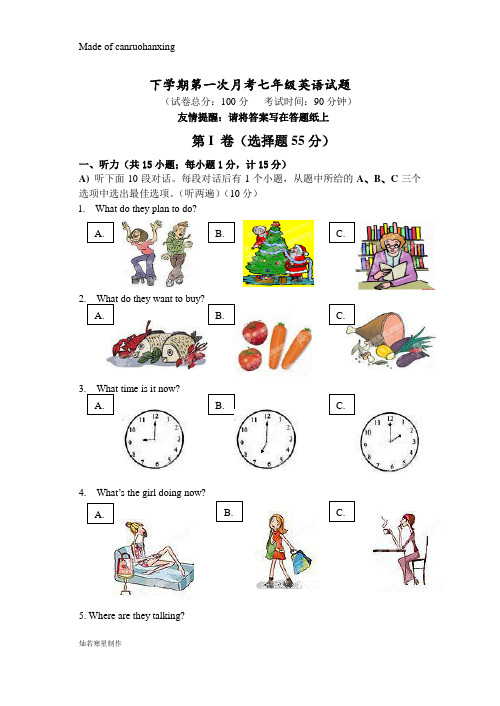
下学期第一次月考七年级英语试题(试卷总分:100分考试时间:90分钟)友情提醒:请将答案写在答题纸上第I 卷(选择题55分)一、听力(共15小题;每小题1分,计15分)A) 听下面10段对话。
每段对话后有1个小题,从题中所给的A、B、C三个选项中选出最佳选项。
(听两遍)(10分)1. What do they plan to do?2. What do they want to buy?3. What time is it now?4. What’s the girl doing now?5. Where are they talking?A.A.A.A.B.B.B.B.C.C.C.C.A. In the classroom.B. In the bookshop.C. In the library.6. Who works in a school?A. Father.B. I.C. Mother.7. How many pens are there in Sandy’s pencil case?A. 7.B. 4.C. 11.8. What’s the bag made of?A. Leather.B. S ilk.C. Wool.9. When will John have a birthday party?A. Next Sunday.B. Next Saturday.C. Next Friday.10. Why is Amy late?A. Because she went to bed late.B. Because she likes sleeping.C. Because she is ill.B) 听对话和短文回答问题,听两遍。
(10分)听一段对话,回答第11—12小题。
11. Where do they want to go?A. The Great Wall.B. The Eiffel Tower.C. Mount Fuji.12. When will they start?A. 10:08.B. 8:00.C. 8:10.听一篇短文,完成表格信息。
牛津译林版七年级下 Unit 1 Integrated skills教学课件 (共24张PPT)

invite you to my house
Pre-task Task 1
What kind of rooms are there in my home?
kitchen
sitting room
bedroom
bathroom
dining room
study
Pre-task Task2
He’s in his new house.
2.What is his new telephone number?
It’s 5557 2118.
Useful expressions:
1.May I speak to …, please?
2.This is … speaking./ Speaking.
East or west,
home is the best.
金屋银屋,不如自家的草屋。
Draw a picture about your dream home and write an article about it in English.
Thank you !
Aug.11 2005
1
Neil
the UK
He lives im is...
While-task Task2
Listen to Neil and put the pictures in the right order. Write the numbers 1-6 in the box.
Listen and answer:
Simon is very happy now and he is calling Daniel. Do you know why?
Because he has a big new house.
七下英语第一次月考作文译林版
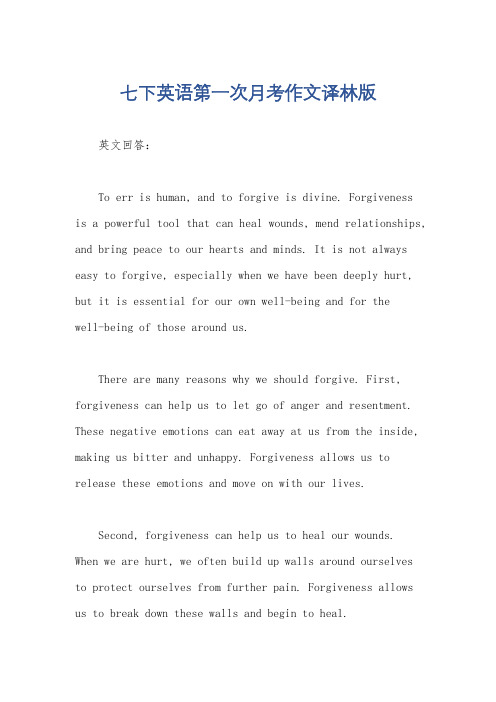
七下英语第一次月考作文译林版英文回答:To err is human, and to forgive is divine. Forgivenessis a powerful tool that can heal wounds, mend relationships, and bring peace to our hearts and minds. It is not always easy to forgive, especially when we have been deeply hurt, but it is essential for our own well-being and for thewell-being of those around us.There are many reasons why we should forgive. First, forgiveness can help us to let go of anger and resentment. These negative emotions can eat away at us from the inside, making us bitter and unhappy. Forgiveness allows us to release these emotions and move on with our lives.Second, forgiveness can help us to heal our wounds. When we are hurt, we often build up walls around ourselvesto protect ourselves from further pain. Forgiveness allows us to break down these walls and begin to heal.Third, forgiveness can help us to mend relationships. When we forgive someone, we are opening ourselves up to the possibility of reconciliation. Forgiveness does not meanthat we condone what the other person did, but it does mean that we are willing to let go of the past and move forward.Fourth, forgiveness can bring us peace. When we forgive, we are not only letting go of the past, but we are also opening ourselves up to the possibility of a brighter future. Forgiveness can bring us a sense of peace and tranquility that we may not have thought possible.Of course, forgiveness is not always easy. There may be times when we feel like we cannot forgive someone for what they have done. However, it is important to remember that forgiveness is a choice. We can choose to hold on to anger and resentment, or we can choose to let go and forgive.If you are struggling to forgive someone, there are a few things you can do. First, try to understand why the person hurt you. This does not mean that you are condoningtheir behavior, but it can help you to see things fromtheir perspective.Second, focus on the benefits of forgiveness. How will forgiveness help you to heal, mend relationships, and bring peace to your life?Third, seek support from others. Talk to a friend,family member, or therapist about what you are going through. They can offer support and encouragement as you work through the process of forgiveness.Forgiveness is not a sign of weakness. It is a sign of strength. It takes courage to forgive someone who has hurt us, but it is worth it. Forgiveness can heal our wounds, mend relationships, and bring peace to our hearts and minds.中文回答:人非圣贤,孰能无过;化干戈为玉帛,才是上上之策。
七下英语第一次月考作文译林版

七下英语第一次月考作文译林版As the first English test in the seventh grade, the monthly exam is coming soon. It is essential for us to make adequate preparations for it. Here are some tips for you to get fully prepared for the upcoming test.First and foremost, it is crucial to review the knowledge we have learned in class. We should go through the textbooks and class notes, and make sure we understand all the key points and have a clear idea of the grammar rules and vocabulary. Besides, practicing past exam papers can also help us get familiar with the exam format and improve our test-taking skills.Secondly, we need to pay attention to our writing skills. In the test, we may be required to write an essay, a letter or a short story. Therefore, it is necessary to practice writing different types of compositions. We can choose some topics and write compositions on them, and then ask our teachers or classmates to give us some feedback. By doing so, we can gradually improve our writing skills and be well-prepared for the writing part of the test.In addition, it is important to enhance our listening and speaking abilities. We can listen to English songs, watch English movies or TV shows, and practice speaking with our friends or family members. By doing so, we can improve our listening comprehension and speaking fluency, which will be helpful for the listening and speaking parts of the test.Last but not least, we should keep a positive attitude towards the test. Instead of feeling stressed or anxious, we should believe in ourselves and stay confident. It is important to stay calm and focused during the test, and do our best to show what we have learned.In conclusion, with thorough review, regular practice, and a positive attitude, we can definitely make good preparations for the upcoming English test. Let's work hard and strive for good results in the test!。
七年级下册译林英语第一阶段月考
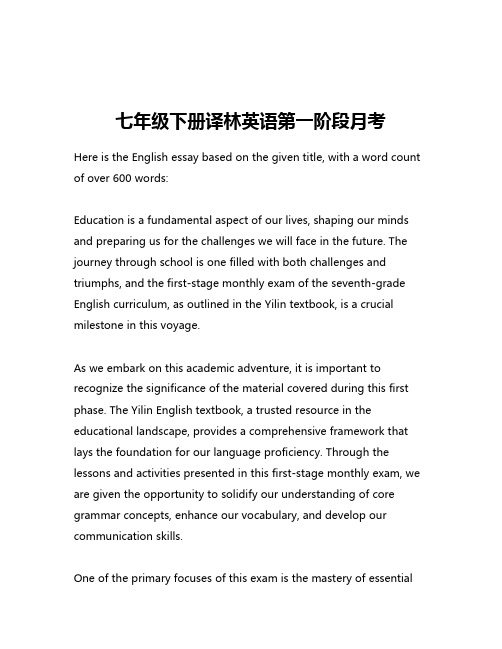
七年级下册译林英语第一阶段月考Here is the English essay based on the given title, with a word count of over 600 words:Education is a fundamental aspect of our lives, shaping our minds and preparing us for the challenges we will face in the future. The journey through school is one filled with both challenges and triumphs, and the first-stage monthly exam of the seventh-grade English curriculum, as outlined in the Yilin textbook, is a crucial milestone in this voyage.As we embark on this academic adventure, it is important to recognize the significance of the material covered during this first phase. The Yilin English textbook, a trusted resource in the educational landscape, provides a comprehensive framework that lays the foundation for our language proficiency. Through the lessons and activities presented in this first-stage monthly exam, we are given the opportunity to solidify our understanding of core grammar concepts, enhance our vocabulary, and develop our communication skills.One of the primary focuses of this exam is the mastery of essentialgrammar structures. From the correct usage of verb tenses to the proper formation of sentences, these building blocks of the English language are the cornerstone of effective communication. By delving into the intricacies of grammar, we not only improve our written expression but also strengthen our ability to comprehend and engage with the language in a more profound manner.Alongside grammar, the first-stage monthly exam also emphasizes the expansion of our vocabulary. As we navigate through various topics and themes, we are exposed to a wealth of new words and their contextual applications. This exposure not only enriches our linguistic repertoire but also enables us to express ourselves with greater precision and nuance. The ability to accurately convey our thoughts and ideas is a key component of successful communication, and the focus on vocabulary development during this exam lays the groundwork for this essential skill.Moreover, the exam challenges us to hone our communication skills, both in written and oral forms. Through exercises that require us to engage in dialogues, comprehend passages, and compose written responses, we are given the opportunity to put our language skills into practice. This practical application not only reinforces our understanding of the material but also prepares us for the real-world scenarios we will encounter as we continue our educational journey.As we approach this first-stage monthly exam, it is important to approach it with a sense of dedication and determination. The knowledge and skills we acquire during this phase will serve as the foundation for our future language proficiency, and the effort we put forth now will undoubtedly pay dividends down the line. Whether it is through diligent study, active participation in class, or a commitment to regular practice, each step we take towards mastering the content of this exam will bring us closer to achieving our language learning goals.In conclusion, the first-stage monthly exam of the seventh-grade English curriculum, as outlined in the Yilin textbook, is a pivotal moment in our educational journey. By focusing on the development of grammar, vocabulary, and communication skills, this exam provides us with the necessary tools to become proficient in the English language. As we approach this challenge, let us embrace the opportunity to grow, learn, and ultimately, expand our horizons through the power of language.。
牛津译林版英语七年级下册说课课件

e some adjectives to express their feelings.
★Difficult point
To talk about the amazing things in English.
The analysis of the students
The analysis of the teaching material
Status&Function Teaching aims Key points and difficult point
Status &Functions
This passage is the first lesson of unit 5. It plays a very important part in the English teaching of this unit. By studying this unit, students can improve their learning ability and the skills of listening、speaking、 reading and writing.
• Cultivate students’ability to imitate
and repeat.
• Understand the theory :“practice makes perfect”.
Teaching methods
※ Audio-visual teaching method ※ Communicative teaching method ※ Task-based teaching method
牛津译林版七年级英语下册Unit1复习说课稿
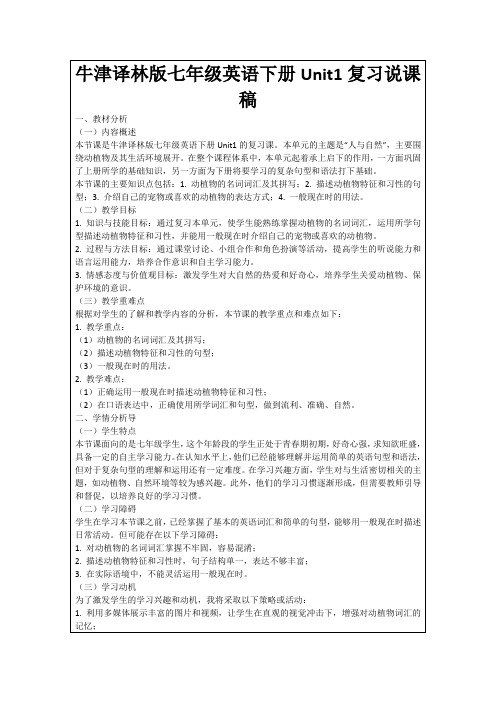
一、教材分析
(一)内容概述
本节课是牛津译林版七年级英语下册Unit1的复习课。本单元的主题是“人与自然”,主要围绕动植物及其生活环境展开。在整个课程体系中,本单元起着承上启下的作用,一方面巩固了上册所学的基础知识,另一方面为下册将要学习的复杂句型和语法打下基础。
2.情境教学法:利用生动、具体的情境,激发学生的学习兴趣,帮助他们更好地理解、记忆和运用所学知识。这一方法的理论依据是情境认知理论,强调学习应发生在真实、有意义的情境中。
3.合作学习法:通过小组合作,促进学生之间的互动与交流,培养他们的团队协作能力和自主学习能力。这一方法的理论依据是社会文化理论,强调学习过程中的社会互动。
三、教学方法与手段
(一)教学策略
在本节课中,我将采用以下主要教学方法:任务型教学法、情境教学法和合作学习法。
1.任务型教学法:通过设计具有真实性和挑战性的任务,引导学生积极参与,提高他们的语言实际运用能力。理论依据是建构主义学习理论,认为学习是学生在原有知识体系的基础上,通过与外部环境的互动主动建构知识的过程。
1.利用多媒体展示丰富的图片和视频,让学生在直观的视觉冲击下,增强对动植物词汇的记忆;
2.设计有趣的角色扮演活动,让学生在模拟真实语境中,运用所学知识进行交流;
3.创设竞争氛围,开展小组竞赛,激发学生的学习积极性和团队合作精神;
4.结合学生的生活实际,引导他们关注身边的动植物,培养他们的观察力和环保意识。
(二)媒体资源
在本节课中,我将使用以下教具、多媒体资源和技术工具:
1.教具:实物、PPT、视频、音频等,丰富教学手段,提高学生的学习积极性。
3.技术工具:投影仪、电脑、平板等,方便展示教学资源,实现课堂互动。
初中英语七年级下册(牛津译林版)Unit1Grammar说课稿

(三)教学重难点
根据对学生的了解和教学内容的分析,本节课的教学重点和难点如下:
1.教学重点:
-一般现在时的概念和用法;
-一般现在时的肯定句、否定句和疑问句结构;
-动词第三人称单数形式的变换规则。
2.教学难点:
-学生对于一般现在时中动词第三人称单数形式的掌握;
-学生在实际情景中灵活运用一般现在时进行表达;
-学生对于一般现在时与其他时态的区分和运用。
二、学情分析导
(一)学生特点
本节课面向的是初中一年级的学生,这个年龄段的学生正处于青春期,好奇心强,求知欲旺盛,具备一定的自主学习能力。在认知水平上,他们已经具备了一定的词汇量和语法知识,能够理解和使用简单的英语进行交流。此外,学生对于新鲜事物有较高的兴趣,喜欢通过互动和游戏等方式进行学习。
初中英语七年级下册(牛津译林版)Unit1Grammar说课稿
一、教材分析
(一)内容概述
本节课的教学内容选自初中英语七年级下册(牛津译林版)Unit 1 Grammar。本单元的主题是"Finding your way",主要围绕问路和指路展开,讲述了在日常生活中如何使用基本的方位词和短语进行表达。本节课的语法内容是"一般现在时",在整个课程体系中,它是学生在学习了动词一般过去时之后的又一个重要时态,为今后学习其他时态打下基础。
2.设计丰富多样的课堂活动,如小组竞赛、角色扮演等,激发学生的学习兴趣;
3.利用多媒体教学资源,如图片、视频等,增加课堂趣味性;
4.鼓励学生积极参与课堂,并及时给予肯定和表扬,提高学生的自信心;
5.引导学生进行自主学习与合作学习,培养学生的团队意识和解决问题的能力。通过以上策略和活动,旨在激发学生的学习兴趣,提高他们的学习动机,从而提高学习效果。
牛津译林版英语七下第二学期第一次月考

七年级英语第二学期第一次月考一、单项选择。
(15分)( )1.There are _____days in a week and Tuesday is ______day of a week.A seven , third B.seven , the third C. seventh , three D. the seventh ,three( )2. Mr Wang is _______ engineer. He works very hard.A the B. a C. an D. /( )3. The hall is big enough_______ five hundred students in it.A. to holdB. holdingC. to holdsD. to holding( )4. ----How do you read 10,206 in English?-----It is “_________”A .one thousand , two hundred and six B.one thousand , two hundreds and sixC.ten thousands ,two hundred and sixD.ten thousand,two hundred and six( )5. The teacher asks us not to __________the playground in class.A .look into B. look out for C. look out at D. look up( )6. -----Where does your uncle work ?------He works in Ottawa , the capital of ________.A .France B.Canada C. The USA D. Japan( )7. There_______ a meeting tomorrow afternoonA will be going toB will have C. is going to have D. is going to be( )8. They are going _______ a basketball match tomorrow.A. watchingB. to watchC. watchD. watches( )9. We can make a fire_______ the room warm.A. to keepB. keepingC. keepD. keeps( )10. Jim ,______his father , _______playing basketball very much .A.like ,likeB.likes ,likesC. like ,likesD. likes ,like( )11. The young boy often helps his father _______ machines.A fix B. fixes C. to fixing D. fixing( )12. There is _______with my computer .I will ask my uncle _______it this afternoon.A .wrong something; to fix B. something wrong; fixingC.something wrong; to fixD. wrong something; fixing( )13. My mother does not feel _________.She will go to see a doctor after work.A. hungryB.wellC. luckyD. sick( )14. If you are hungry ,______ have some sandwiches ?A why not to B.why not C. why don ’t D. why( )15.All the children are looking forward to ______ some presents.A. gettingB. to getC.getD.gets二、完形填空(10 )John is an interesting young man. He likes to wear his hair very long. 1 of his friends think it looks like a 2 hair, but never make jokes (开玩笑) about it, 3 John is a big, strong man and he doesn't like jokes about his hair.John always goes to the barber's (理发店) twice a 4 to cut(剪) and wash his hair, and one day the barber 5 to him, "Now why don't you 6 me cut most of your hair off and make your head tidy(整治)? No one will recognize (认出) you if I do that, I'm 7 ."John says 8 for a few seconds, and then he says, "Maybe you are 9 , but I'm sure that no one will recognize you, either (也), if you do that to my 10 .”( ) 1. A. Little B. No C. Some D Few姓名:________________ 班级:_________________ 考号:____________________( ) 2. A. girl B. girl's C. girls D. woman( ) 3. A. because B. so C. that D. but( ) 4. A. year B. day C. hour D. month( ) 5. A. says B. talks C. speaks D. tells( ) 6. A. lets B. letting C. let D. to let( )7. A. sure B. right C. of course D. wrong( )8. A. something B. anything C. nothing D. everything( )9.A. fine B. wrong C. clever D. right( )10. A. hand B. face C. back D. hair三、阅读理解(30分)(A)Dear Jenny,How are you? Thanks for your last letter.I like English and Maths, too. I think they're interesting and useful(有用的). Our school is over at 3:40 p. m. every day and I can get home at 4 o'clock, but I don't go home at once(立刻).On Monday afternoon, I have a violin lesson from 4:00 to 5:00. I like sports, and I'm in the school basketball team with our P. E. teacher on Tuesday afternoon. On Wednesday afternoon, I go shopping with my parents. We buy a lot of food and fruits, and I like eating them very much. On Thursday, I often watch TV at home after school. I like Sports World very much On Saturday we don't have classes. I often sing in an art school. I like singing and I can sing better now. I usually go to the park or have a rest at home on Sunday. I'm busy every day, but I'm very happy because I have fun in my life.Yours,Alice( )1. Alice likes_______.A. Chinese and MathsB. English and ChineseC. English and MathsD. English and Biology( )2. Alice's school is over at_______ in the afternoon every day.A. 3:40B. 4:00C. 4:40D. 5:00( )3. Alice has a violin lesson for_______ on Monday afternoonA. half an hourB. an hourC. two hoursD. three hours( )4. What does Alice do on Tuesday afternoon?A. She plays basketball at school.B. She plays the violin at school.C. She goes shopping with her parents.D. She watches TV at home.( )5. What does Alice often do on Saturday?A. She often plays the violinB. She often goes to the park.C. She often has a rest at home.D. She often sings in an art school.(B)( ) 1. How many kinds of animals are talked about(被谈论) in the passage?A. FourB. FiveC. SixD. Seven( ) 2. Now Mr Smith is in the zoo with his two sons, one aged 14 and the other 10, how much are the tickets together?A. $4.00B. $3. 00C. $2. 00D. $1.00( ) 3. Which of the following is the visiting time?A. 8:30 A. m. Monday.B. 9:30 A. m. Friday.C. 3:00 p.m. Sunday.D. 5:00 p.m. Tuesday.( ) 4. What does the underlined (画线的) word "except" mean?A. but notB. and alsoC. the same asD. at times( ) 5. Which of the following may we do in the zoo?A. To give some food to the fish.B. To touch the monkeys on the head.C. To throw things everywhere.D. To take a few nice photos.(C)Bees live in little houses made of wood. Each house has a very small door for them to come in and out. We call their houses hives (蜂箱). When the flowers of plants in the fields begin to come out, the bees fly away very early in the morning to get the sweet juice (甜汁) of the flowers.A bee has a long tongue (舌头). it goes into the flower to suck (吸) up the juice. Then it carries the juice to the hive, and turns it into honey (蜜). When the bee flies out to look for flowers, it may go to places very far, but it never loses its way. When the rain comes out again, it will fly home. Bees collect not only the juice but also the pollen (花粉) from inside the flowers. They carry the pollen home to make beebread for the young bees.1. We may guess the houses of the bees are like ______A. small buildingsB. big bagsC. ballsD. boxes2. Bees come out to _______.A. get the flowers of plantsB. get only the juice of the flowersC. look for their hivesD. get both the juice and the pollen3. The bee gets the juice out of the flowers with its ______A. mouthB. tongueC. noseD. legs4. Which of the following sentences is true?A. Although bees fly far away from their hives, they can find their way home.B. If the bee flies too far away, it can’t find its home.C. Bees do their collecting work only in the fields near their hives.D. Bees must go very far to find the flowers5. the word “beebread” means ______.A. the living place of beesB. bread for beesC. food for beesD. sweet juice四、根据音标写单词。
(word)七年级下牛津译林新版unit1教案

总课题课题教学目标教学重点教学难点课前预习Step1Warm-up (presentation)Step2.ListeningStep3.Languagepoints:7BUnit1Dreamhomes总课时7第1课时Welcometotheunit课型NewToreadandlearnaboutdifferenttypesofhomesandlifestyles.. Toobtaindetailsabouthomesindifferentcountries. Torespondtothetextbymakingstatementsabouttheforeignstudents’activities.anarticletointroducetheirownhomes,usingthefourhomepagesasam odel.Haveadiscussioningroups,andtalkabouttheirdreamhomes. Haveadiscussioningroups,andtalkabouttheirdreamhomes. Previewthenewwordsandphrases.Totalkaboutthefavouriteplace.教学过程1.Askifanystudentshavelivedinanothercountry.Elicitfromstudentsideasaboutanidealplacetolive.amini-survey.Askstudentswhichistheir favourite place tolive.Listen tothetape,answer myquestion,WhichisEddie’sfavouriteplacetolive?Helpthe Sstoanswer.Listenagain,Ssreadafterthetaperecorder,thenactitout.’d like tolive nextto arestaurant.wouldlikesth.=wantsthwouldliketodosth=wanttodosthe.g.Wouldyoulik esomewater?=D o youwantsomewater?Wouldyouliketogowithus?Yes,I’dlove/liketo.=Doyouwanttogowithus?Yes,I do.1Step4. Countriesand capitalsStep5:Discussion(task):Step5:Sum-upStep6:Homework nextto=besidee.g.Tom’shouseisnexttowantstositnexttome. Learnabouthomesindifferentcountries. learnaboutI wanttolearn moreabouttheworld. learnfromWeshouldhelpeachotherandlearn fromeachother.③different→sameindifferentclasses inthesameclassstudentstostudythepicturesonpage7.2.Say:The capital ofChina is Beijing.TheCapital is themost important city in a country.Ask studentstodoPartB.Askthemto checkwithothers.Haveadiscussion ingroupsof fourtotalkabouttheir dreamhomes.Each group will chooseastudentto tell us abouthis/herdreamhome.Why? Languagepoints: ThecapitaloftheUSAisWashingtoncapitalof⋯⋯e.g.Nanjing isthe capital of Jiangsu Province.ThecapitalofChinaisBeijing.Gothrough the new words and the languagepoints learnt during this lesson.1.Reviewthe contents ofthis lesson.2articles about students’dreamhomes.教学反思1.总课题7BUnit1Dreamhomes总课时7第2课时课题Reading(1)课型New1.Tounderstanddifferentcountrieslivingenvironment.教学目标 2.Toaccesstotheinformationofdifferentwaysoflife.Thestudydescription,descriptionoftheothershomelifestyle.Howtodescribehome,descriptionwayoflife.教学重点1.Thephraseandthesentencepattern:masterHowtodescribehome,descriptionwayoflife.教学难点2.Thephraseandthesentencepattern:master课前预习Previewthenewwordsandphrases.教学过程Step1.Wherewouldyoulike to live in?WhydoFreetalk youlike it?What’s thecapital of theUK?Use these sentences to makeadialogue.Step2Show Workinpairstheaims Showthe learning aimstothe students. Step3TeachersaysMydreamhomeisn’ta Presentationflat because it is too small.Iwouldn’t like tolive in a palacebecause it is toobig.Iwould like to3Step4 Practice Step5 Reading Step6 Summaryliveinahouselikethis.Thenshowapictureofawoodenhousewithtwofloors.Tellthestudentslook,hereisabeautifulhouse.Itismydreamhome.It isn ’tinabig city. It i s inatownandnearthesea.WhenIamfree,Icanwalkonthebeachandenjoythesunshine . It i s awoodenhouse.Doyou likemydreamhome? Then,askWhatroomsdoIneedImy dreamhome?andteachthenewwords.Doyouliveinaflatorinahouse? Whatroomsdoyouhave?Whatdoyoudoineachof these rooms?Askandanswerinpairs.InChina,mostofusliveintallbuildings.Whataboutpeopleinothercountries?Doyo uknowaboutthehomes indifferentcountries? Today,wewill readfourhomepagesoffourforeign students.Theywouldliketotellus something about theirhomes.Now, please readtheir homepages.Whatare theirnames? Listentothetapeandanswerthequestions. Stephen:Whereishefrom?Whichishisfavouriteplace?Why? Wheredoeshechatwithfriends? Analyzethelanguagepoints. UsethesamewaytoreadMadee ’s .Madee:Wheredoeshelive? Whereis he rhouse?Wholiveswithherinherhouse? UsethesamewaytoreadNeil. Neil:WhereisNeilfrom?Whatdoeshis mother do in hisfavouriteroom?ThesametoAnna.Whatdoesshelike todoafter dinner?Doesshehaveherownbedroom?4out(of)⋯e.g.Don’tlookoutofthewindowinclass.look at/around/for /like /forwardto/after/up2. wooden(adj.)→wood(n.)e.g.Weneedsomewoodenchairs.Thishouseismadeofwood.Iclimbaladdertogetintomyhouse. =I get into myhouse with aladder.e.g.Ioftengotoherhousetoseeoften goes t o theshoppingmalltoplaycomputergames.②getinto→getoutof getintothecargetoutofthecarIdonothavemyownbedroom.own(adj./v.)→owner(n.)e.g.Iseewithmyowneyes.Who’sthe ownerofthispen?=Whoownsthispen?MyfamilyandIoftensitinthekitchenwhilemymothermakesdinner.e.g.IamreadingbookswhilemybrotheriswatchingTV.Shecalledwhileyouwereout.Ishareabedroomwithmysister.sharesthwithsbe.g. Theboysharedhis toywith otherchildren shareinsthe.g. Weshould s harein oursorrows aswellasjoys.Ourneighboursarefriendlyandwearehappyhere.’m friendlywithher.befriendlytosbe.g.Peopleareusuallyfriendlytoforeignfriends.wrotedownthemeaningofsome5ofthewords.write+n.+down=writedown+n.writeit/themdown e.g.Canyouwritedownthewordsonyourbook?=Canyouwrite thewordsonyour book ?②meaning(n.)→mean(v.)e.g.What’sthemeaningof“quick?=Whatdoes“quick〞mean?gardenisthebestplacetogrowflowers.e.g.It’sreallyagoodplacetogo.Step7:I’mhungry.DoyouhaveanythingtoHomework eat?islyingonhisbunkbeds.lie→lying tie→tying die→dying tellaliee.g.Don’ttell alieanymore.It’snotgoodforyou.thenewwordsandthetext.the homepages ofthe twostudents.教学反思总课题7BUnit1Dreamhomes总课时7第3课时课题Reading(2)课型New1.Masterthenewwordsandphrases教学目标 2.Getthestudentstolearnhowtodescribetheirowndreamhomes.3.Improvethestudents’speakingandwritingability.教学重点 1.Getthestudentstolearnhowtodescribetheirowndreamhomes.6Improvethestudents’speakingandwritingability.Getthestudentstolearnhowtodescribetheirowndreamhomes.Improvethestudents’speakingandwritingability.教学难点教学过程Step1RevisionStep2Phras esStep3 RetellingStep4.Cons olidations Revise the contents we learnedyesterday by asking them s ome questionsaboutdifferentkindsofhomesofthefourstudents.2.work.Thestudentsworkingroupsoffo urtochecktheusefulphrasesinthepages. Listthephrasesontheblackboard.Talkaboutthemwiththeclass.Askmoreablestudentstoretellthe fourpageswiththehelpofphrasesontheblackboard.Asklessablestudentstofillintheblanksaccordingtothephrasesontheblackboard.Askthestudents todoP11,C1.If thesentence iswrong,find out themistakeandcorrectit.P11,C2.Readthewordsintheboxfirst.Thenasksomequestionsabouteachpicture.Next,getthestudentstofillintheblanksbythemselves.Finally,readthesentencesloudly.Wordcompetition.Showthestudentspictures of different rooms orfurniture,and get themtosay thewordsasquickly aspossible.ThenaskthemtofinishP9,B1.Finally,readthesewordsloudly.Groupwork.Thestudentsworkingroupsoffourtomakeupsentencestotalkaboutd ifferentrooms.Askless ablestudentstowritedownthesentencesinthenotebook.Modelsentence:Weusu allyeatmealsinadining room. Then, ask students to7g read their sentences to the class.Finally,askthestudentstofinishP9,B2.HelpSimonwritethecorrectwordsabovethemistakes.thefourpagesloudlyandtrytorememberthem.2.Writeashort pagetointroduce yourownhome.学习*研讨:1.Ishareabedroomwithmysister.我和我姐姐共用一间卧室。
牛津译林七年级英语说课稿
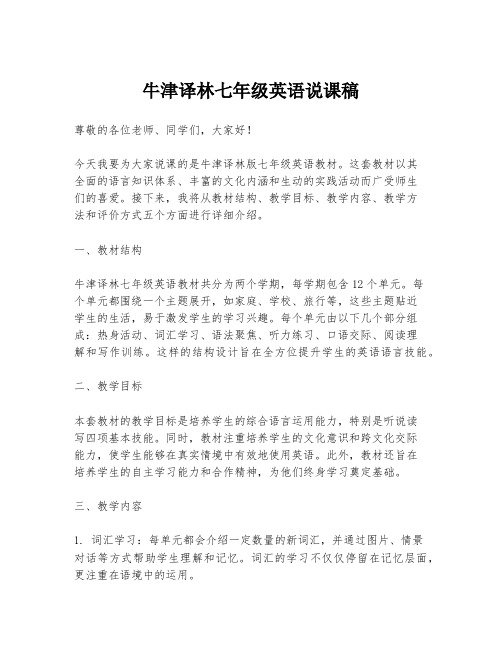
牛津译林七年级英语说课稿尊敬的各位老师、同学们,大家好!今天我要为大家说课的是牛津译林版七年级英语教材。
这套教材以其全面的语言知识体系、丰富的文化内涵和生动的实践活动而广受师生们的喜爱。
接下来,我将从教材结构、教学目标、教学内容、教学方法和评价方式五个方面进行详细介绍。
一、教材结构牛津译林七年级英语教材共分为两个学期,每学期包含12个单元。
每个单元都围绕一个主题展开,如家庭、学校、旅行等,这些主题贴近学生的生活,易于激发学生的学习兴趣。
每个单元由以下几个部分组成:热身活动、词汇学习、语法聚焦、听力练习、口语交际、阅读理解和写作训练。
这样的结构设计旨在全方位提升学生的英语语言技能。
二、教学目标本套教材的教学目标是培养学生的综合语言运用能力,特别是听说读写四项基本技能。
同时,教材注重培养学生的文化意识和跨文化交际能力,使学生能够在真实情境中有效地使用英语。
此外,教材还旨在培养学生的自主学习能力和合作精神,为他们终身学习奠定基础。
三、教学内容1. 词汇学习:每单元都会介绍一定数量的新词汇,并通过图片、情景对话等方式帮助学生理解和记忆。
词汇的学习不仅仅停留在记忆层面,更注重在语境中的运用。
2. 语法聚焦:教材中的语法知识与学生的实际需求相结合,通过图表、例句等形式清晰地展示语法规则,并设计相关练习加强巩固。
3. 听力练习:每个单元都包含听力材料,内容涵盖对话、短文、歌曲等多种形式。
通过听力练习,学生能够提高理解英语口语的能力,并学习到不同场合下的语言表达方式。
4. 口语交际:教材设计了一系列模拟真实情境的口语交际活动,如角色扮演、情景对话等,鼓励学生大胆开口说英语,提高口语表达和交流的能力。
5. 阅读理解:通过阅读短文、故事、广告等不同类型的文本,学生能够提高阅读速度和理解能力,同时扩大词汇量和了解不同文化背景。
6. 写作训练:教材中的写作部分从简单的句子写作开始,逐步过渡到段落和文章的写作。
通过模仿、创作和修改等活动,学生能够提高书面表达能力。
牛津译林版英语七下初一第一次月考

初一英语第一次月考第I卷选择题(共65分)一、听力(每小题1分,满分20分)1)听下面10段对话,每段对话后有1个小题,从题中所给的A、B、C三个选项中选出最佳选项,每段对话读两遍。
(10分)( )5. What does the boy want to be?A. An artist.B. An engineer.C. A policeman.( )6. What do we learn from the dialogue?A. The boy's bike is broken.B. The boy is helpful.C. The boy will help the girl fix her computer.( )7. Where does the boy have lunch?A. In the restaurant.B. At home.C. At school.( )8. How many students are there in the boy's school?A. 150.B. 3,080.C. 3,018.( )9. What will the girl do this afternoon?A. Have a party.B. Visit the old people.C. Go shopping.( )10. Where does the boy live?A. In Eighth Street.B. In Ninth Street.C. In Fifth Street.2)听下面3段材料,每段材料后有几个小题,从题中所给的A、B、C三个选项中选出最佳选项,每段材料读两遍。
(10分)听第—段材料,回答第11-12题。
( )11. What club is the boy in?A. In the dancing club.B. In the drawing club.C. In the singing club.( )12. How often does the boy' go to the club?A. Every day.B. Twice a week.C. Three times a week.听一篇短文,回答第13-15小题。
- 1、下载文档前请自行甄别文档内容的完整性,平台不提供额外的编辑、内容补充、找答案等附加服务。
- 2、"仅部分预览"的文档,不可在线预览部分如存在完整性等问题,可反馈申请退款(可完整预览的文档不适用该条件!)。
- 3、如文档侵犯您的权益,请联系客服反馈,我们会尽快为您处理(人工客服工作时间:9:00-18:30)。
2017-2018学年第二学期第一次阶段练习2018.3班级____________ 姓名______________ 学号______________一.单项选择(共15小题;每小题1分,计15分)( ) 1. Before I talk with_____ engineer, I never meet _________ clever person like him.A. the; theB. an; theC. the; aD. an; a( )2. The old woman often _______ the window at the children in the street.A. looks out atB. looks atC. looks outD. looks out of( ) 3. There _______ two football matches in our school next Friday。
A. is going to haveB. is going to beC. will haveD. are going to be( )4. Would you like to share things ______ your friends ? A. to B. with C. for D. of ( )5. — Would you like to go out to play volleyball with me?— _______, but I should do my homework first.A. Of course not.B. No, thanks.C. Yes, please.D. Yes, I’d love to.( ) 6. ----- What is Simon like? -----____________________.A. He likes reading books.B. He likes his father.C. He is honest and helpful.D. He is an engineer.( ) 7. The house there ___________many trees behind it.A. isB. areC. hasD. have( ) 8. Why not ______ our school hall with your friends?A. visitingB. to visitC. visitD. visited( ) 9. This is ________ English lesson of this term, please listen carefully.A. our firstB. the our firstC. first ourD. our the first( ) 10. There are six floors _________ my flats and I live _________ the top floor.A. on; onB. in; onC. on; inD. in; in( )11. —_________ is your home from the school?—Only ten minutes’ ride on a bike.A. How longB. How oftenC. How farD. Where( ) 12.This bedroom is ___________. They share it now.A. Tom’s and TimB. Tom and Tim’sC. Tom and TimD. Tom’s and Tim’s ( )13.—We will have a school trip next week.—That sounds ________.I’m sure we will have a good time there.A. wellB. badlyC. badD. good( )14. One of my good friends _________his mother in Changzhou now.A. is living withB. lives withC. are living withD. is living( )15. Jack hopes his pen friend _______to the Uk to visit him some day.A. to comeB. comeC. comingD. will come二、完形填空(共10小题;每小题1分,计10分)My dream home is very big and clean. It is near the 16 . I can watch the sea and play volleyball on the beach.My grandparents live 17 us in the big house. Their room is 18 the first floor. I always chat with them and help them 19 some housework on the weekend. On the 20 floor, there is a kitchen and a dining room. All the family 21 will have dinner there. My bedroom, study and bathroom are on the third floor. There is a big balcony in my bedroom. I can play games, read books and chat 22 my friends there. The furniture(家具)in my house is all made of wood. It is good for my health. I like 23 to music while reading books in my bedroom. I always ask my friends to come here. My parents' room is on the fourth floor. It's also very big and clean.There is a big and nice garden behind the big house. There are many flowers and _24__ tall trees in it. In summer, I can sit under the trees with my family. Behind the garden, there is a swimming pool. I can 25 freely in it. I think it is very comfortable to live in my dream home. ()16. A. river B. sea C. ground D. school()17. A. at B. for C. with D. of()18. A. in B. on C. with D. of()19. A. does B. doing C. do D. is doing()20. A. fourth B. third C. first D. second()21. A. pets B. members C. things D. animals()22. A. of B. about C. with D. on()23. A. listening B. leading C. withing D. doing()24. A. few B. a few C. little D. a little()25. A. swim B. dance C. read D. run三.阅读理解(共15小题;每小题2分,计30分)A()26. If you want to fly to Paris, you should take________.A. Flight 137B. Flight 320C. Flight 226D. Flight 405()27. Flight 289 to Hong Kong leaves at_______.A. 11.43a.m.B. 10.12a.m.C. 12.32p.m.D. 10.12a.m.()28. Flight 226 to London is from _________.A. Pan AmericanB. Japan AirlinesC. Air CanadaD. CAACBPaul and I l ive in the same building. His room is on the sixth floor but mine is on the fifth. He’s very careless and sometimes he gets into trouble.Last Friday afternoon the young man and his friends went to spend the weekend on a wild island. They could swim, fish, play the guitar and sleep in the quiet place at night. They enjoyed themselves there and could do anything they wanted. On the third morning they decided to get back to the land. But their boat hit a rock and soon went down. With the villagers’ help, they swam to the bank. Luckily none of them was hurt. They took a taxi and half an hour later they arrived at our town, but it was two in the night. The young man was hungry and thirsty. He wished to get home as soon as possible. Something was wrong with the lift, so he had to go up the stairs. He stopped by my door and brought out a key. Of course he could not open the door. Half an hour passed but he failed. He became angry and shouted, “I’ll cut you down with a knife!”The noise woke me up and I opened the door. I understood at once what was happening and said, “You’re trying to open a wrong door, Paul!”“Sorry, I can’t agree with you, Charlie!” said the young man, “It’s my room. You’ve entered it by mistake!”()29. Paul and his friends enjoyed themselves on the island because ______.A. It was very quiet thereB. there were many fish thereC. they could forget all the troubleD. they could do what they wanted()30. Paul couldn’t open the door because ______.A. it wasn’t his roomB. he couldn’t find the right keyC. he didn’t find the keyholeD. he was too hungry to do it()31. Charlie opened the door to ______.A. help PaulB. stop Paul making the noiseC. see what happened outsideD. call the police station()32. Which of the following is WRONG?A. Paul thought he did right.B. Paul didn’t know where he lived.C. Paul stopped by a door on the fifth floor.D. Paul thought he had reached the sixthCTom, a 15-year-old boy, couldn't hear anything after the whole night computer games and MP3 listening. He was excited and yelled(喊叫)after the MP3. When he walked out of his room the next morning, he could hear nothing about his mother's words. His mother sent him to the doctor at once. It was moderate (中度) hearing loss(耳聋).Do you have an MP3 player? Do you use it to listen to your favorite music? A survey shows that lots of young people enjoy listening to their MP3 players. And they always listen to them at high volumes(音量). There are about 100 million people listening to MP3 players in Europe every day. Most of them are young people. Scientists have found that if people listen to MP3 players at a very high volume for more than five hours a week, they could lose their hearing in five years.High-volume music can keep people excited, so young people would like to keep their players high. It's too bad for the ears. So the MP3 listeners should keep the player within safe volume levels, no higher than 60~70 of full capacity (容量). If people near you can hear your MP3, that means you are keeping your MP3 at a very high volume, turn it down, please!( ) 33. What didn't Tom do before he had moderate hearing loss?A. He played the computer games.B. He yelled after the MP3.C. He listened to the MP3.D. He went to see the doctor.( ) 34. Who enjoys MP3? A. Young people. B. Adults. C. No one. D. Scientists. ( ) 35. What's the safe volume of the MP3?A. People beside you can hear your MP3.B. No higher than 60-70 of full capacity.C. You can't hear it clearly.D. Keep the full capacity.( ) 36. Why do the young people keep the players high?A. Because the people near them can't hear it.B. Because the young people want to surprise others.C. Because the high-volume music can keep them excited.D. Because the young people want to have hearing loss.DA crow(乌鸦) wants to drink, but he can’t find water. He looks here and the re. At last ,he cries ,“I can see a jar罐子) and there is some water in it. ” He tries to get the water, but he can’t. “How can I get the water?” he thinks, “I can put my break (鸟嘴)quite close (靠近)to it.” But still (仍然)he can not drink. “What can I do? I want to drink.” He looks here and there, then he picks up a small stone in his break and carries it to the jar and drops it into the jar. “Soon the water will be high in the jar, and I can drink,” says the crow. So he begins to do that until the water is high enough to drink.( )31. What is the crow looking for? A. A jar B. Water C. Food D. Meat ( )32. Why doesn’t he drink right now(马上)?A. He isn’t very thirsty.B. No water in the jar.C. He doesn’t want to drink it.D. The water isn’t high.( )33. Why does he pick up the stone?A. He is hungry.B. He wants to put them into the jar.C. He wants to make his break strong.D. He is playing a game( )34. Which title (题目)do you think is the best (最好)?A. A Clever CrowB. A thirsty CrowC. A Crow and A Jar of WaterD. A Crow and Stones2017-2018学年第二学期第一次阶段练习2018.3第Ⅱ卷(共45分)四.语音(每题1分,计8分)(一)找出一个划线部分读音与其余三个不同的选项。
